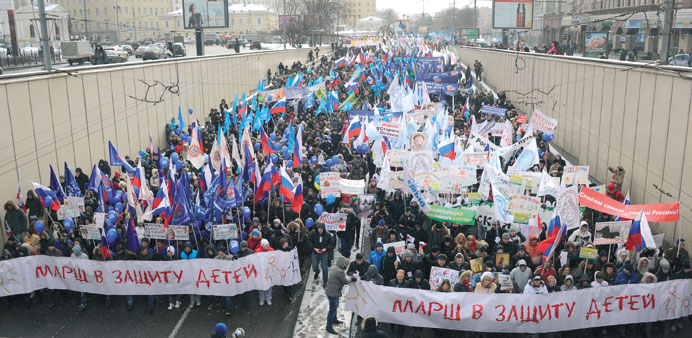Activists from pro-Kremlin children’s advocacy groups march through Moscow to call on authorities to ban all foreign adoptions and demand the return of an adopted boy whose brother died in Texas. The banners read ‘The March for Protection of the Children’.
AFP/Moscow
Russia has said it was concerned by a US ruling that the death of an adopted Russian boy in Texas was an accident, fuelling a diplomatic row as several thousand people marched in Moscow demanding an end to all foreign adoptions.
Russia’s foreign ministry said it had learned of the US coroner’s findings, which clear the boy’s parents of wrongdoing, “with concern” and called on US officials to provide Moscow with the necessary documents, including the death certificate of three-year-old Max Shatto (born Maxim Kuzmin), to help shed light on the case.
“Only an examination of these documents will enable meaningful conclusions to be reached about the circumstances surrounding the Russian child’s death and determine our possible future steps,” the ministry’s rights representative Konstantin Dolgov said in a statement.
President Vladimir Putin’s spokesman added that efforts were under way to try to bring home Max’s two-year-old brother, whose Russian name is Kirill and who is also being raised by the Shatto couple.
“Certain steps are being taken to bring back (Kirill),” Dmitry Peskov told Dozhd, a private television channel. “There are very complicated legal circumstances related to the possibility of such a return.”
According to the autopsy results, the boy died from a lacerated artery in his bowel due to blunt force trauma in his abdomen. The coroner’s report also noted that the child had a mental disorder that caused him to hurt himself.
Officials in the US cleared the boy’s adoptive parents Laura and Alan Shatto of homicide but the couple could still face negligence charges for leaving the boy alone in their backyard, where he was found unconscious in January.
The Kremlin children’s rights envoy Pavel Astakhov reacted to the US findings with scepticism.
“The triumph of justice?” he wrote on Twitter, adding that the boy had become a “victim of big politics”.
The two Russian boys were born to an alcoholic mother and were placed in an orphanage when their mother was stripped of parental rights.
Meanwhile, thousands of people, including activists from pro-Kremlin children’s advocacy groups, braved a temperature of -8 degrees Celsius to march through Moscow urging a ban on foreign adoptions and demanding the return of Max’s brother.
“Our children are not a commodity,” one demonstrator chanted through a loudspeaker as crowds carried national flags, icons and pictures of children who died after being adopted in the West.
“Our main demand is to bring Kirill home and ban Western adoptions,” said Irina Bergset from the Russian Mothers movement, who helped organise the march. She said she considered the results of the US autopsy to be “American propaganda”.
Speaking to AFP after the march she said the march participants had written a letter to Putin asking him to facilitate the return of the adopted boy.
Bergset said the protesters also wanted a ban on all foreign adoptions by French nationals.
“They legalised same-sex marriages in France,” she said. “What’s normal for France is abnormal for Russia.”
“Until we ban them (foreign adoptions), our people will be putting their hopes in foreign adopters and good Samaritans,” added Oxana Garnayeva, head of the charity group Russian Birch.
Moscow police said around 12,000 people had participated in the march, while an AFP photographer estimated the turnout at around 10,000.
The co-organiser of the march Bergset said 20,000 showed up for the march and a subsequent rally, adding that lawmakers from the ruling United Russia party also participated.
Late last year, Russia introduced a ban on all American adoptions in retaliation for a US bill targeting Russian officials with sanctions over the prison death of Russian lawyer Sergei Magnitsky.
In January, at least 20,000 Russians led by the anti-Kremlin opposition marched through Moscow to protest the Kremlin ban that they dubbed the “law of scoundrels”.
According to official estimates, US families have adopted more than 60,000 Russian children over the past two decades, 21 of whom have died.

